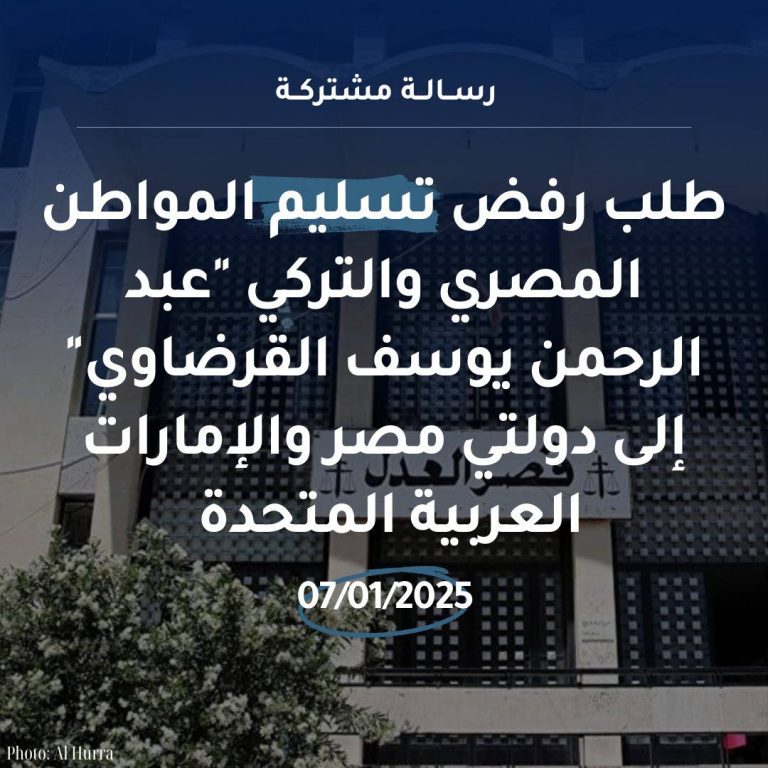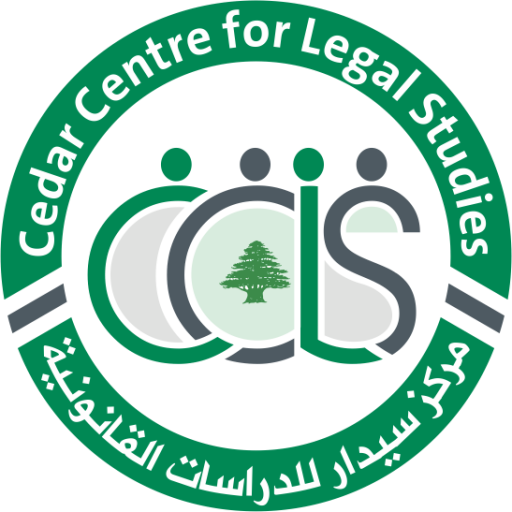Cedar Centre For Legal Studies
Joint Statement
Request to Refuse the Extradition of Egyptian and Turkish Citizen Abdul Rahman Youssef Al-Qaradawi to Egypt and the United Arab Emirates
07 January 2025

Beirut, January 7, 2025
To: His Excellency the Prime Minister Mr. Najib Mikati,
Subject: Request to Refuse the Extradition of Egyptian and Turkish Citizen Abdul Rahman Youssef Al-Qaradawi to Egypt and the United Arab Emirates
From: Lebanese and International Human Rights Organizations
On Saturday, December 28, 2024, the Lebanese General Security arrested the political poet Abdul Rahman Youssef Al-Qaradawi, who holds both Egyptian and Turkish citizenships, at the Masnaa border crossing after he had arrived from Syria. It was revealed that his arrest was based on two requests transmitted through the Council of Arab Interior Ministers. The first request, issued by Egypt, is based on a court ruling sentencing him to three years in prison for allegedly “spreading false news” and “insulting judicial authorities” in interviews and on social media. The second request, issued by the United Arab Emirates, is based on a complaint from the Emirati Public Prosecution concerning a video he published on social media celebrating the fall of the Assad regime in Syria, which included criticism of the foreign policies of Egypt, the UAE, and Saudi Arabia for what he claimed was their support for Israel.
Following his arrest, Al-Qaradawi was referred to the Lebanese Public Prosecutor’s Office, where he was questioned, and his detention was ordered pending a decision on the extradition requests submitted by Egypt and the UAE. He remains in custody to date.
The undersigned human rights organizations call on the Lebanese Council of Ministers to refuse the extradition of Al-Qaradawi to both Egypt and the UAE, for the following reasons:
- The extradition requests are based on politically motivated charges
It is clear that the extradition requests are based on actions undertaken by Al-Qaradawi in exercising his right to freedom of political expression, as guaranteed by Article 13 of the Lebanese Constitution and Article 19 of the International Covenant on Civil and Political Rights. Therefore, the charges fall within the realm of politically motivated offenses.
Lebanese law and the Arab conventions to which Lebanon is a party explicitly prohibit the extradition of individuals for political crimes, as stipulated in:
- Article 34 of the Penal Code, which states: “Extradition shall be refused if it arises from a political offense or appears to serve a political purpose.”
- Article 4 of the Arab Convention on the Extradition of Offenders (1952), which states: “Extradition shall not be granted for political offenses, and the determination of whether the offense is political rests with the requested state.”
- Article 26 of the Judicial Agreement between Lebanon and Egypt, which explicitly prohibits extradition between the two countries for political offenses.
- Extradition should be refused due to the risk of torture in both Egypt and the UAE
Article 3 of the Convention against Torture, to which Lebanon is a party, states: “No State Party shall expel, return (‘refouler’), or extradite a person to another State where there are substantial grounds for believing that he would be in danger of being subjected to torture.”
Under international human rights law, the principle of non-refoulement, which is binding on Lebanon, prohibits the return of any individual to a country where they risk torture, inhumane treatment, or other irreparable harm.
There are credible grounds to believe that Al-Qaradawi would face a serious risk of torture if extradited to either Egypt or the UAE, as documented by human rights organizations:
- In the UAE: Detainees in the UAE, particularly in cases allegedly related to state security, face grave risks, including arbitrary detention, incommunicado detention, torture, ill-treatment, prolonged solitary confinement, and denial of legal assistance. Coerced confessions are often used as evidence in trials, and detainees have reported overcrowding, unsanitary conditions, and inadequate medical care.
- In Egypt: Since 2013, torture has become widespread in Egypt at the hands of security forces. The systematic impunity for such practices has shaped the authoritarian nature of the regime. The National Security Sector and police forces under the Ministry of Interior have extensively employed arbitrary arrests, enforced disappearances, and torture against suspected dissidents, many of whom are alleged sympathizers of the Muslim Brotherhood, as well as journalists, bloggers, political activists from various backgrounds, and human rights defenders. Torture in Egypt amounts to a possible crime against humanity due to evidence of its widespread use as a state policy
Conclusion
Given the above, and considering that Mr. Abdul Rahman Youssef Al-Qaradawi is a poet and political activist, and that the extradition requests from Egypt and the UAE are based on allegations of politically motivated offenses linked to his expression of opposition views, and given the credible risks of torture he would face if extradited to either country,
The undersigned human rights organizations respectfully urge the Lebanese Council of Ministers to refuse the extradition of Mr. Abdul Rahman Youssef Al-Qaradawi to the authorities of either Egypt or the UAE for the following reasons:
- The extradition requests are based on politically motivated offenses linked to his exercise of freedom of political expression, as per Article 34 of the Penal Code, Article 4 of the Arab Convention on the Extradition of Offenders, and Article 26 of the Judicial Agreement between Lebanon and Egypt.
- There are substantial grounds to believe that he would face a risk of torture if extradited to either country, in violation of Article 3 of the Convention against Torture.
NGO Signatures:
- Lebanese Center for Human Rights
- Legal Agenda
- LADE
- Cedar Centre for legal studies
- SMEX
- Egyptian Human rights Forum
- Egytian Front For Human Rights
- Egyptwide Egyptian Italian initiative for rights and Freedoms
- Middle East Studies Center
- Egyptian Commission for rights and freedom
- Sinai Foundation for Human Rights
- RPE
- Egyptian initiative for personal rights
- EuroMed Rights
- Human rights watch
- FairSquare
- Mena Rights Group
- Helem
